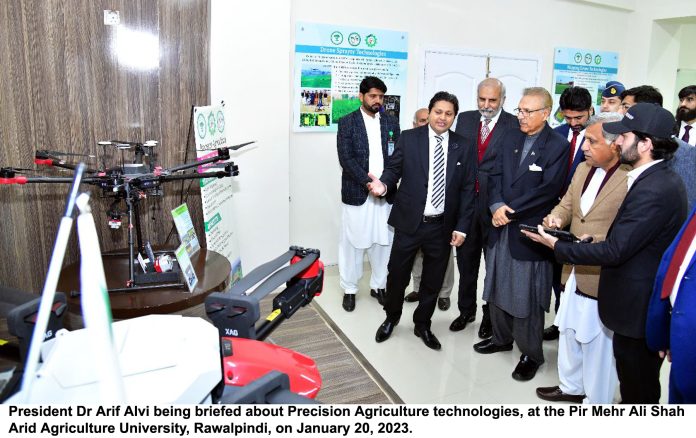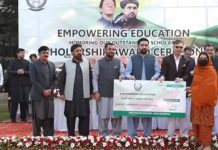
DNA
ISLAMABAD, JAN 20: President Dr Arif Alvi has called upon the nation to cast their votes with utmost responsibility and due diligence to select their representatives who were capable of taking smart and speedy decisions and had the capability to oversee their timely and accelerated implementation. He said that elections and voting provided the citizens with the opportunity to carefully choose their representatives so that they could provide quality leadership and put the country on the path of progress, prosperity and development.
The President expressed these views while addressing the inaugural ceremony of the National Centre of Industrial Biotechnology at the Pir Mehr Ali Shah Arid Agriculture University, Rawalpindi, on Friday. Former Pro-Chancellor of the University and Former Minister for Agriculture Punjab, Syed Hussain Jahania Gardezi, Vice-Chancellor Prof Dr Qamar-uz-Zaman, also addressed the occasion.
Addressing the occasion, the President said that there was no dearth of ideas in Pakistan rather we were facing an abundance of them, however, Pakistan lacked the institutions, relevant laws and supporting policies to keep pace with changes happening in the world at a lightning-speed and implement wealth-generating ideas in the country. He said that Pakistan needed to develop intellect-based highly responsive institutions and systems capable of making smart decisions and keeping pace with the developed countries which would help generate products and services which could be readily accepted in the international markets.
The President said that despite Pakistan being an agricultural country, it, unfortunately, suffered from malnutrition and a shortage of agricultural commodities, however, it had the potential to be self-sufficient and export food surplus to other countries. This, he said, could be achieved by developing creative and innovative agriculture processes and techniques which in the developed world had led to the development of high-yielding crops requiring minimum inputs. He called upon the research institutions of the country and the agriculturists to learn from the best global agricultural practices and combine them with indigenous research to produce high-yielding seeds and crops, besides adopting cost-effective vertical farming and hydroponic agricultural techniques to substantially increase the agricultural output of the country.
The President underlined that Pakistan received abundant water through rains and snow, which was sufficient to meet the country’s needs and could also be saved for future use. He said that Pakistan needed to communicate and transfer current agricultural knowledge and optimized techniques to the farmers at the grassroots level, besides promoting water-efficient means of irrigation to help transform centuries-old cultivation and irrigation methods prevalent in our country. This, he added, would not only help the country in achieving self-sufficiency but would also help improve the life and livelihood of Pakistan’s farmers.
The President stated that the neck-breaking speed of scientific advancements had made available instruments and analytical tools which could provide data on the composition, nature and kind of soil which could be further analyzed through software to provide recommendations regarding the nutritional and water needs of crops around the year. He said that these scientific inventions should be used by our research institutes to develop customized systems and solutions and perpetually communicate them to the farmers for the optimal utilization of land, seed, water and human input.
The President further said that as compared to the past, knowledge and information had become readily and abundantly available and accessible to everyone around the world in all sectors and disciplines due to the advancements in the field of IT and cloud technology. He said that we should provide the means and the required resources to our students, teachers, researchers and other sectors to enable them to tap this immense knowledge resource and help enhance their knowledge base, expertise, and intellect. He added that it would help improve business, trade and investment processes and would bring qualitative improvements in the country’s industry, and its products and services.
The President said that knowledge was progressing at a fast pace and Artificial Intelligence was changing the way of life and was bringing a paradigm shift in the quality, efficacy and nature of the products and services. He said that the revolutionary introduction of the GPT3 platform had brought in new challenges and opportunities for the people. He said that this AI-based platform was capable of creating articles, stories, and thesis and research products that were indistinguishable from the research produced by humans. He said that we should inculcate the use of AI in all our processes, both in the public and private sectors, to bring much-needed efficiency to our systems.
The President also said that Pakistan faced a shortage of electricity and gas, adding that we should change our attitude and world-view towards energy consumption and focus our energies and resources to use renewable energy sources, like solar and wind energy, for meeting our energy needs.
The President observed that Pakistan was seized with the issue of a fast-growing population whereas this growth rate could be substantially reduced by bringing in economic prosperity and providing education for all, which would automatically arrest the trend of rising population. He said that by providing education and improving people’s economic conditions, many countries had successfully reduced population growth to zero. He said that Pakistan should employ out-of-the-box solutions, adding that by merely ensuring the availability of contraceptive products to the target population, 9 million unwanted pregnancies could be reduced by half.
Former Pro-Chancellor of the University and Former Minister for Agriculture Punjab, on the occasion said that Pakistan had not developed its human resources and its agriculture sector to its fullest potential. He said that the productivity and per acre yield of Pakistan’s agriculture sector could be substantially enhanced by the introduction of technology, mechanization, and precision farming techniques.
Vice-Chancellor Prof Dr Qamar-uz-Zaman informed that 40 programmes in the Industrial and Biotechnology had been restored at the university, besides taking steps for enhancing the skills, quality and training of the staff and the faculty of the university.
Earlier, the President inaugurated the National Centre of Industrial Biotechnology at the university, besides visiting the Centre for Precision Agriculture and Big Data Agriculture Repository.
















